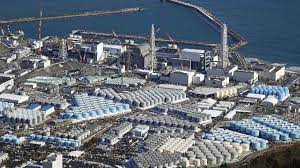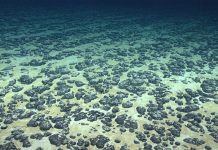Japan has announced it will release more than 1m tonnes of contaminated water from the wrecked Fukushima nuclear power plant into the sea, a decision that has angered neighbouring countries, including China, and local fishers.
Official confirmation of the move, which came more than a decade after the nuclear disaster, will deal a further blow to the fishing industry in Fukushima, which has opposed the measure for years.
The prime minister, Yoshihide Suga, told a meeting of ministers on Tuesday that the government had decided that releasing the water into the Pacific Ocean was the “most realistic” option, and “unavoidable in order to achieve Fukushima’s recovery”.
The plant’s operator, Tokyo Electric Power [Tepco], and government officials say tritium, a radioactive material that is not harmful in small amounts, cannot be removed from the water, but other radionuclides can be reduced to levels allowed for release.
“The Japanese government has compiled basic policies to release the processed water into the ocean, after ensuring the safety levels of the water … and while the government takes measures to prevent reputational damage,” Suga told reporters.
Work to release the diluted water will begin in about two years, the government said, with the entire process expected to take decades.
“On the premise of strict compliance with regulatory standards that have been established, we select oceanic release,” it said in a statement.
China denounced the plan as “extremely irresponsible”, and accused Japan of reaching the decision “without regard for domestic and foreign doubts and opposition”.
“This approach is extremely irresponsible and will seriously damage international public health and safety and the vital interests of the people of neighbouring countries,” the Chinese foreign ministry said in a statement on its website.
South Korea summoned Japan’s ambassador, Koichi Aiboshi, the broadcaster YTN reported, while a high-level government official said Seoul “firmly opposes” the move, a view also expressed by Taiwan’s Atomic Energy Council.
The U.S was supportive, describing Japan’s decision-making process as “transparent”.
“We thank Japan for its transparent efforts in its decision to dispose of the treated water from the Fukushima Daiichi site,” the secretary of state, Antony Blinken, tweeted.
The announcement drew swift condemnation from environmental groups.
Greenpeace Japan said it “strongly condemned” the water’s release, which “completely disregards the human rights and interests of the people in Fukushima, wider Japan and the Asia-Pacific region”.
“The Japanese government has once again failed the people of Fukushima,” said Kazue Suzuki, the group’s climate and energy campaigner.
“The government has taken the wholly unjustified decision to deliberately contaminate the Pacific Ocean with radioactive waste. It has discounted the radiation risks and turned its back on the clear evidence that sufficient storage capacity is available on the nuclear site as well as in surrounding districts.
The cabinet’s decision failed to protect the environment and neglected the large-scale opposition and concerns of the local Fukushima residents, as well as the neighbouring citizens around Japan.”
About 1.25m tonnes of water has accumulated at the site of the nuclear plant, which was crippled after going into meltdown following a tsunami in 2011.
It includes water used to cool the plant, as well as rain and groundwater that seeps in daily. The water needs to be filtered again to remove harmful isotopes and will be diluted to meet international standards before any release, the government said.
The radioactive water, which increases in quantity by about 140 tonnes a day, is now being stored in more than 1,000 tanks, and space at the site is expected to run out around next autumn. Tepco has argued that it will struggle to make progress on decommissioning the plant if it has to keep building more storage tanks at the site.
The International Atomic Energy Agency supports the decision, since radioactive elements, except tritium, will be removed from the water or reduced to safe levels before it is discharged. The IAEA has also pointed out that nuclear plants around the world use a similar process to dispose of wastewater.
Experts say tritium is only harmful to humans in large doses and with dilution the treated water poses no scientifically detectable risk.
“There is consensus among scientists that the impact on health is minuscule,” Michiaki Kai, an expert on radiation risk assessment at Japan’s Oita University of Nursing and Health Sciences, told Agence France-Presse before the decision was announced.
But local fishing communities say the water’s release will undo years of hard work to rebuild consumer confidence in their seafood.
“They told us that they wouldn’t release the water into the sea without the support of fishermen,” Kanji Tachiya, who heads a local fisheries cooperative in Fukushima, told public broadcaster NHK ahead of the announcement. “We can’t back this move to break that promise and release the water into the sea unilaterally.”
The decision comes about three months ahead of the postponed Olympic Games in Tokyo, with some events planned as close as 60km (35 miles) from the plant.
Japanese officials have objected to media descriptions of the water as “contaminated” or “radioactive”, insisting that it be described as “treated”.
Shaun Burnie, senior nuclear specialist with Greenpeace East Asia, said that claim was “clearly false”.
“If it was not contaminated or radioactive they would not need approval (to release the water) from Japan’s nuclear regulator,” he said. “The water in the tanks is indeed treated, but it is also contaminated with radioactivity. The Japanese government has been deliberately seeking to deceive over this issue, at home and abroad.”.
SOURCE: THE GUARDIAN/PACNEWS













